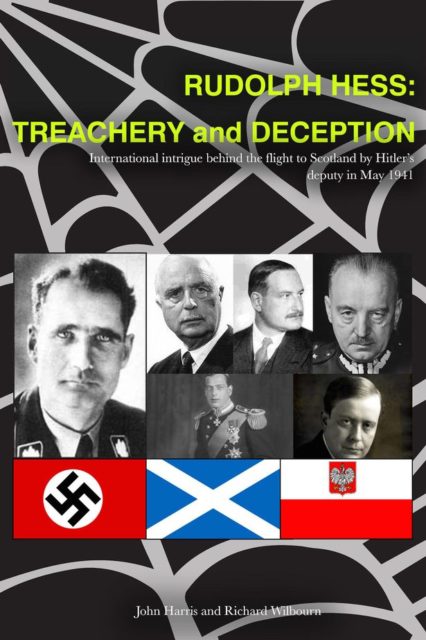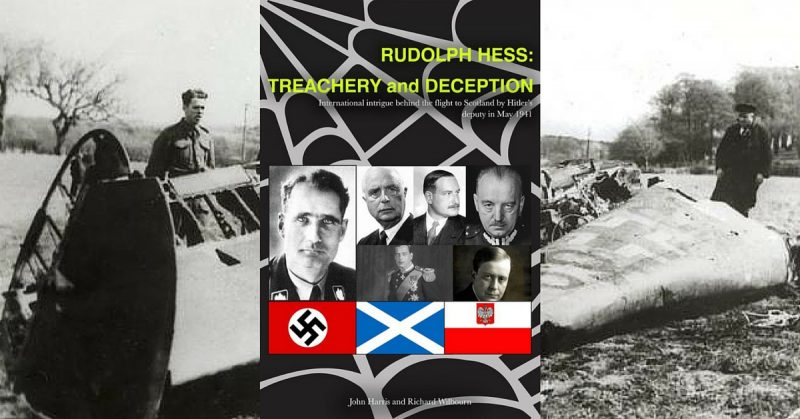At the time this book was offered to us my colleague Joris asked me what I thought about the prospect. I have made no secret of the aversion I have to many books about the Nazis.
It’s not out of any exaggerated symptoms of offence at perceived apologists for Nazi criminality, but that I find what amounts to a broad obsession with them to be done to death.
There is no doubt that many aspects of the Nazi era military are fascinating but it seems to me that there are other things to write about.
But the Nazis; their tanks, guns and even their commemorative spoons are rich fodder for authors and publishers. What is so different about the book we have here?
The answer, for me, is the jury is still out. I don’t know how I really feel about it beyond telling you it makes at times gripping, almost compulsive, reading.
The authors strike me as either obsessive or certainly borderline in their pursuit of the truth about Rudolf Hess’ bizarre solo flight to Scotland in May 1941. But they have worked their butts off over a long period of time to investigate the many-layered cake that is the flight of Rudolf Hess.
It would be idiotic to believe that the Deputy Fuhrer of the Third Reich would zip over to bonny Scotland and bale out of his Bf110 on a whim.
The escapade took planning and this doesn’t just apply solely to Hess and the Germans. The authors delve deep into the background of a rather large cast of players in the saga.
Messrs Harris and Wilbourn introduced me to a good many people I had never heard of and added depth to one or two known to me. As with all stories, some are attractive, while others are tragic. A few are not the sort of blokes you hope your daughter will bring home.
The authors look at events and conversations in Germany that might have prompted Hess to fly to Britain and, crucially; who he had been corresponding with in the UK. Who had he come to see?
Ultimately all the fascination is centered on who Hess was dealing with in Britain. Were they traitors, idealists or clever spooks drawing him into a trap? Might they have been a broad mix of all three?
Inevitably the questions about how much Churchill knew and any connections with the British royal family will stand out. Hess’ mission took place just before Barbarossa.
Churchill had warned the Russians thanks to Ultra but a paranoid Stalin demurred and hedged his bets. Hess was close to his long-time friend and ally Adolf Hitler.
How much did he know about it in advance? Who was pulling the strings in London and Berlin? The authors accept that there is much more to learn.
After his capture, Hess was branded mentally ill by Hitler in a strong attempt to disassociate himself from a mission he might well have helped plan. In Britain, the last thing Churchill wanted as he stepped up wooing the United States was giving any impression that he would negotiate with the Nazis.
What was the role of the royal family, notably the Duke of Kent and Queen Mary? How do the exiled Polish leadership fit in and what about the many members of the British establishment who were either anti-Churchill on the one hand or even pro-fascist on the other? There are so many questions.
The authors acknowledge they are chasing a story, but their long journey has taught them to identify Trojan horses and cul-de-sacs.
You so want to be able to point a finger at specific individuals. Associated events such as the fatal air crash of the Duke of Kent, the king’s younger brother, add grist to a pretty dusty mill.
Perhaps it was just a combination of coincidence and circumstance, but the Hess saga was made for conspiracy theorists and sober analysts alike. It is a detective story where some of the key witnesses made sure there were no paper trails and other important players had their tracks covered.
This leads to many more questions. We might ask ourselves if the drama of Hess is equal in terms of doubt and awe as the assassination of JFK. The questions, realistic or otherwise will just not go away.
When I was a lad there were two shadowy figures who offered regular fodder for media attention. Both were prisoners, but of a very different sort.
One was Howard Hughes, a man who we know was imprisoned by his own imagination, whose alleged visits to London caused a scrum of hacks and snappers eager to get a glimpse of the great man of mystery.
A similar sort of interest applied to Rudolf Hess, imprisoned at Spandau and rarely seen by a Cold War era media still gripped by the legacy of the Nazis.
This is where any similarities diverge, but it was this aura, mystery and so many unanswered questions that made Hess and Hughes so attractive to the media.
Quite clearly Messrs Harris and Wilbourn have not finished their quest. Perhaps they won’t get any further. Huge piles of British official documents are buried deep under Welsh mountains, most never to appear in my lifetime.
It is a fact that in this story and others the reputations of people living and dead are being protected by the system. I have to ask what harm it would do for the truth to be revealed.
How much would it impact on the future of the British monarchy or the establishment and what would it change in our hearts and minds in respect of Winston Churchill and the powers who led Britain to victory in 1945?
The authors confirm there could have been no peace treaty between Britain and Nazi Germany while Hitler remained in power. This opens up yet more questions.
But the events of May 1941 happened just weeks before Hitler’s ambition took him on the path of total destruction of his thousand-year Reich. Some things are academic.
Many people would prefer to let Hess and his adventure fade. Matters should rest. Or should they? As an exercise in research and analysis, this book makes for an often intense read.
Finding your way out of the labyrinth is not easy. The authors do their best to make things straightforward but they are dealing with a maze of events and circumstances that appear to consume them sometimes.
The result is a passionate and utterly driven account of a bizarre saga. You might find some of it a little over-the-top but a complete understanding of the Nazi hierarchy could not be achieved without immersion into the whacky world of Rudolf Hess. He was a nutjob in a dark and dangerous buffet of fruitcakes.
There remain more questions than answers. I doubt we have heard the last of John Harris and Richard Wilbourn. I admire their tenacity, am thoroughly impressed by their work rate and can say this book is unlike any I have read in a while.
It is so passionate, so determined and utterly breathless. I imagine they may have made a few enemies. They have hooked a marlin. Getting it in the boat may take much more effort.
Reviewed by Mark Barnes for War History Online

RUDOLF HESS
Treachery and Deception
By John Harris and Richard Wilbourn
Jema Publications
ISBN: 978 1 871468 94 6
